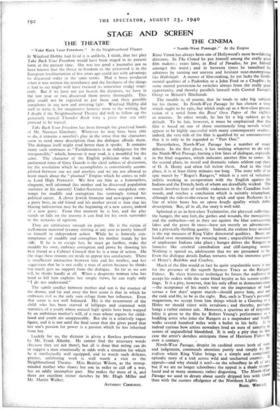THE CINEMA
North-West Passage." At the Empire KING VIDOR has always been one of Hollywood's most bewildering directors. In The Crowd he put himself among the really great film makers ; years later, in Bird of Paradise, he put himself amongst the worst ; and in between times he tantalised his admirers by turning out uneven and hesitant near-masterpieces like Hallelujah. A master of film-making, he yet lacks the funda- mental qualities of a Pudovkin or a John Ford or a Chaplin ; by some mental perversion he switches always from the really great opportunity, and thereby parallels himself with Central Europe's Otzep or Britain's Hitchcock.
The trouble is, of course, that he tends to take big subjects for his theme. In North-West Passage he has chosen a story which ought to be epic, but which ends up as a first-class presen- tation of a serial from the Boys' Own Paper of the eighties or nineties. In other words, he has let a big subject go by default. To be fair, however, it must be emphasised that this film is based on one of those enormously long novels which appear to be highly successful with many contemporary readers ; indeed, the very title of the film is qualified by an announcement that it is only to be regarded as " Part One."
Nevertheless, North-West Passage has a number of major defects. In the first place, it has nothing whatever to do with the North-West Passage, barring a few lines of dialogue, especially in the final sequence, which indicates another film to come. In the second place, its moral and dramatic values seldom cap those of G. A. Henty and often fall below them. And in the third place, it is at least thirty minutes too long. The story tells of an epic march by "Roger's Rangers," which is a sort of voluntary militia working in co-operation with the English against the Indians and the French, both of whom are dreadfully wicked. The march involves feats of terrible endurance in the Canadian back- woods, and reaches a conclusion which is suitably triumphant, although the ride-to-the-rescue by spick and span Redcoats in a lihe of white boats has an opera bouffe quality which defies description. But, all in all, the story is well told.
Splashed at us in first-class Technicolor, the physical sufferings, the hunger, the sore feet, the gashes and wounds, the mosquitoes, and the ambushes—set as they are against the blue unreasoning lakes and the grave fir trees—have not merely an adventurous, but a physically thrilling quality. Indeed, the realism here attained is the top measure of King Vidor directorial qualities. Boats are hauled over mountains by sweating men ; unparalleled massacres of unpleasant Indians take place ; hunger drives the Rangers to lunacies like cerebral cannibalism and cliff-jumping mania. Nothing is spared us, adolescents that we are presumed to be. Even the dialogue details Indian tortures with the immense gust" of Henty's Redskin and Cowboy.
Much of the film would in fact be quite unpalatable were it not for the presence of the superb Spencer Tracy as the Rangers' Fithrer. By sheer histrionic technique he forces the audience to accept his orders with the same blind loyalty as his screen under- lings. It is a pity, however, that his only effort at democratisation —the acceptance of his men's vote on the importance of food versus a few days' urgent march—should prove him, and not the rank and file, to be in the right. But, such is Tracy's personal magnetism, we accept from him things which in a Goering or a Hitler we should reject with revulsion ; and thereby, perhaps, hangs a rather sinister tale. Moreover, a spurious air of respecta- bility is given to the film by Robert Young's performance as 3 budding artist who joins the Rangers as a mapmaker and finally walks several hundred miles with a bullet in his belly. It is indeed curious how artists nowadays lend an aura of sanctity to scenes of unparalleled bloodshed. It is only a pity that in this case the artist's sketches anticipate those of Harrison Fisher by over a century.
North-West Passage, despite its cardinal errors both of taste and judgement, commands attention purely and simply by the
completely
realism which King Vidor brings to a simple and episodic story of a trek across wild and uncharted country'. It appeals—and why should it not?—to the schoolboy in all of Us; but if we are no longer schoolboys the appeal is a shade shame" faced and at many moments rather disgusting. The North-West Passage we used to dream about surely dripped less with blood than with the austere effulgence of the Northern Lights.
Bit. WEIGHT.






























 Previous page
Previous page